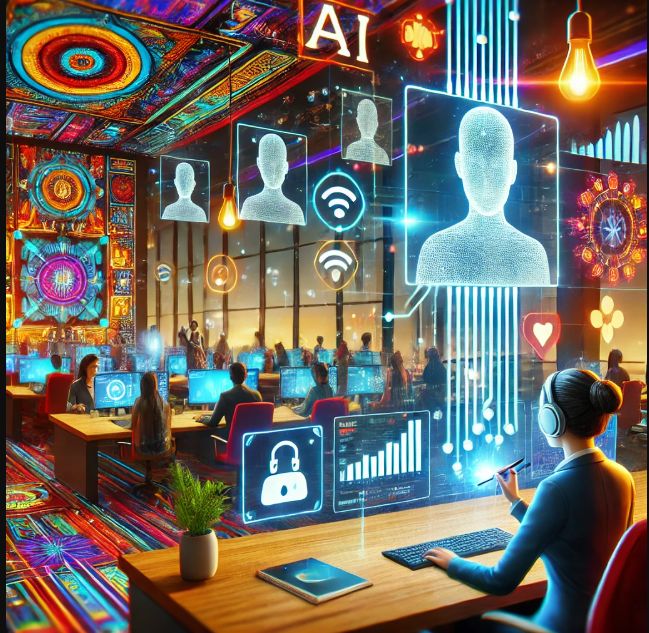Artificial Intelligence (AI) is revolutionizing every aspect of modern business, and human resources (HR) is no exception. From automating repetitive tasks to enhancing decision-making, AI is reshaping how HR professionals manage people, processes, and strategies. In today’s competitive business environment, leveraging AI in HR is not just an option—it’s a necessity for staying relevant and effective.
This article explores how AI is transforming HR practices, the challenges it presents, and actionable strategies to harness its potential while maintaining a human-centric approach.
For any assistance in
HRMS, Payroll & Compliance Outsourcing, Tax Management or S&E Registration, do contact us.
We provide PAN India service.
Click here to get the Lowest QuotesHow AI is Revolutionizing HR
AI is enabling HR teams to shift from administrative functions to strategic initiatives. Here are key ways AI is reshaping HR processes:
- Accelerated Recruitment: AI-powered tools can sift through resumes, rank candidates based on predefined criteria, and even schedule interviews, significantly reducing time-to-hire.
- Personalized Employee Engagement: AI analyzes employee behavior to provide tailored recommendations for career growth, improving engagement and satisfaction.
- Skills Development: Advanced analytics identify skills gaps and suggest targeted training programs to upskill employees efficiently.
- Seamless Query Resolution: AI-driven chatbots provide instant answers to common employee queries, freeing HR teams to focus on more complex issues.
- Bias-Free Hiring: AI emphasizes skills and qualifications, reducing the likelihood of unconscious bias in recruitment decisions.
- Enhanced Feedback Mechanisms: Automating feedback collection and analysis helps organizations better understand employee needs and make informed decisions.
Challenges in AI-Driven HR Practices
Despite its transformative potential, AI in HR comes with its share of challenges:
- Data Dependency: AI is only as effective as the data it processes. Poor-quality or biased data can lead to inaccurate results.
- Transparency Issues: AI decisions must be explainable to maintain trust among employees. Lack of clarity can lead to skepticism about the fairness of AI-generated outcomes.
- Privacy Concerns: AI tools require extensive data, raising concerns about confidentiality and compliance with data protection laws.
- Integration Complexity: Incorporating AI into existing HR systems may require significant investment in infrastructure and training.
- Resistance to Change: Employees may fear job displacement or distrust AI’s role in decision-making, leading to reluctance in adoption.
- Cost Implications: Implementing and maintaining AI solutions can be expensive, especially for smaller organizations.
Strategies to Overcome AI Challenges in HR
Organizations can mitigate the challenges of integrating AI in HR with the following strategies:
- Data Governance: Establish clear policies for data collection, usage, and security. Ensure transparency in how data is used to build trust.
- Fairness Audits: Regularly review AI outputs to detect and address biases or inconsistencies. Incorporate diverse perspectives during AI model development.
- Employee Communication: Provide clear information about how AI complements human roles rather than replacing them. Create open channels for feedback.
- Phased Implementation: Begin with smaller, well-defined AI use cases and scale gradually as employees and systems adapt.
- Skill Development: Train HR professionals and employees to understand and effectively use AI tools, fostering a culture of adaptability.
Practical Applications of AI in HR
To unlock AI’s full potential, HR teams should focus on areas where AI adds maximum value:
- Streamlining Recruitment: Use AI to analyze resumes, identify top candidates, and automate interview scheduling.
- Improving Onboarding: Personalize onboarding journeys with AI-driven content recommendations.
- Enhancing Employee Well-being: Leverage AI insights to identify stress patterns and recommend wellness initiatives.
- Optimizing Workforce Planning: Utilize predictive analytics to forecast hiring needs and improve workforce allocation.
The Future of HR in an AI-Driven World
AI’s role in HR will continue to expand, moving beyond transactional tasks to strategic areas such as employee development, workforce analytics, and organizational planning. By integrating AI across the employee lifecycle, HR teams can foster a data-driven culture that aligns with organizational goals.
As AI technologies evolve, HR professionals will need to strike a balance between automation and human empathy. The future of HR lies in leveraging AI to enhance decision-making while preserving the human touch that defines workplace relationships.
In conclusion, AI is not just a tool but a transformative force for HR. By embracing its potential responsibly and strategically, organizations can create more agile, efficient, and employee-centric HR functions that drive long-term success.
For any assistance in
HRMS, Payroll & Compliance Outsourcing, Tax Management or S&E Registration, do contact us.
We provide PAN India service.
Click here to get the Lowest Quotes




